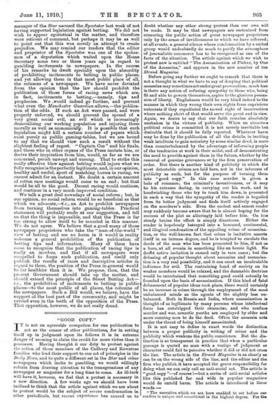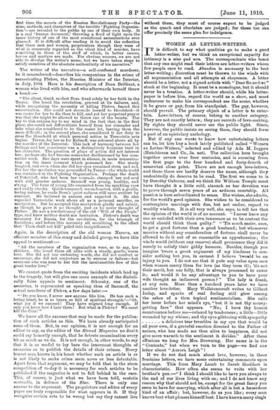" GOOD COPY."
TT is not an agreeable occupation for one publication to act as the censor of other publications, for in setting itself up in judgment upon its fellows it is in extreme danger of seeming to claim the credit for more virtae than it possesses. Having thought it our duty to protest against the action of those members of the Cadbury and Rowntree families who lend their support to one set of principles in the Daily News, and to quite a different set in the Star and other newspapers which incite to gambling, we would willingly refrain from drawing attention to the transgressions of any newspaper or magazine for a long time to come. As ill-luck will have it, however, we feel that a protest is necessary in a new direction. A few weeks ago we should have been inclined to think that the article against which we are about to protest would be the subject of severe condemnation in other periodicals, but recent experience has caused us to
doubt whether any other strong protest than our own will be made. It may be that newspapers are restrained from censuring the public action of great newspaper proprietors only by the sense of invidiousness to which we have referred; at all events, a general silence where condemnation by a united group would undoubtedly do much to purify the atmosphere of journalistic commerce has to be recognised as one of the facts of the situation. The article against which we wish to protest now is entitled " The Assassination of Plehve, by One of the Assassins," and appears in the new number of the Strand Magazine.
Before going any further we ought to remark that there is not a thought in what we have to say of denying that political assassins may sometimes act under great provocation; much less is there any notion of refusing sympathy to those who, being fit and able to govern themselves, aspire to the glorious posses. sion of liberty. Englishmen would be very blind indeed to the manner in which they wrung their own rights from capricious autocrats if they repudiated the sacred right of insurrection where nothing short of that would serve the great end in view.
Again, we desire to say that our faith remains absolutely unshaken in the virtues of publicity. When an atrocious political crime is committed it is not merely inevitable but desirable that it should be fully reported. Whatever harm may be done by the publication of all the details, in inciting weak intellects to gain notoriety by some similar deed, is more than counterbalanced by the advantage of informing people of the tendencies at work in their midst, and of demonstrating
the need to provide against them in the future, whether by the removal of genuine grievances or by the firm preservation of order. But there is another kind of publicity in which the most detestable crimes are laid bare, not in the interests of publicity as such, but for the purpose of turning them into "good copy." In this case murder is given a halo of romance; the criminal's inventiveness, or it may be his extreme daring, in carrying out his work, and in hoodwinking those who try to track him down, is presented in such a way that the sympathy of the reader is beguiled from its better judgment and finds itself actively engaged on the murderer's aide. Even the coolest and sanest reader may suddenly become aware that he is almost hoping for the success of the plot so alluringly laid before him. On less steady brains the effect is simply disastrous. Either the reader is hopelessly betrayed into a bemused, sentimental, and illogical condonation of the apps Ming crime of assassina- tion, or the well-known fact that crime is imitative asserts itself in an intense degree, and he is tempted to emulate the deeds of the man who has been presented to him, if not as a hero, at all events in something like an heroin light. No doubt active imitation is caused only in rare cases ; but the debasing of popular thought about assassins and assassina- tion is a very real possibility, and it can exert an incalculable influence for evil. The restraining hand of society on its weaker members would be relaxed, and the damnable doctrine would be entertained that something good could actually be founded upon the basis of assassination. If this kind of fatal debasement of popular ideas took place, there would certainly be an increase in crime through the employment of the most unbalanced minds as the agents of the slightly less un- balanced. Both in Russia and India, where assassination is thought of as legitimate by many persons whose intellectual force has outstripped their character, and who confuse murder and war, neurotic youths are employed by older and more cunning men to do the deed. Often the assassin acts under the threat of being himself assassinated.
It is not easy to define in exact words the distinction between a proper publicity in writing of crime and the publicity which weakens the public conscience. But the dia. tinction is so transparent in practice that when a particular passage is quoted no man with a vestige of judgment or character could fail to perceive whether it did or did not cross the line. The article in the Strand Magazine is as clearly as can be on the wrong side of the line, and the editor and the firm who publish it have accepted the grave responsibility for doing what we can only call an anti-social act. The article is "good copy "—of course!—but a series of anti-social articles like this published far and wide in popular magazines would do untold harm. The article is introduced in these words :--- "The narrative which we are here enabled to set before our readers is unique and sensational in the highest degree. For the first time the secrets of the Russian Revolutionary Party—the aims, methods, and characters of the terrible Fighting Organiza- tion '—arc revealed to the public by one of their own body. It is a real 'human document,' throwing a flood of light upon the inner history of one of the most sensational assassinations ever planned. It is difficult after reading it to avoid the reflection that these men and women, perpetrators though they were of wl at is commonly regarded as the vilest kind of murder, have scmething in them of the stuff of which, in better causes, heroes and martyrs are made. For obvious reasons, we are not able to divulge the writer's name, but we have taken steps to satisfy ourselves of the absolute authenticity of his narrative."
The writer of the narrative—a self-confessed murderer, be it remembered—describes his companions in the crime of assassinating Plehve, the Russian Minister of the Interior, in July, 1904. Here is his description of Dora Brilliant, a woman who lived with him, and who afterwards herself threw a bomb :-
" The silent, timid, modest Dora lived solely by her faith in the Terror. She loved the revolution, grieved at its failures, and, while recognizing the necessity of killing Plehve, feared this assassination. She could not reconcile herself to bloodshed—it was easier for her to die than to kill, and yet her perpetual prayer was that she might be allowed to throw one of the bombs. The key to this enigma lay to my mind in the fact that, in the first place, she could not differentiate herself from her comrades and take what she considered to be the easier lot, leaving them the more difficult; in the second place, she considered it her duty to cross the threshold at which personal action in Terroristic acts begins. Terror, for her as for Kaliaeff, was coloured above all by the sacrifice of the Terrorist. This lack of harmony between her feelings and her conscience was a distinctively feminine trait in her character. The question of plans of action did not interest her; perhaps she had become somewhat disillusioned by her com- mittee work. Her days were spent in silence, in mute concentra- tion on the inner torment which possessed her. She rarely laughed, and even when she did her eyes remained stern and sad. For her the revolution was personified by Terror—the whole world was contained in the Fighting Organization. Perhaps the death of Pokotilof, who had been her comrade, stamped her sad soul with still greater sadness. Sazonoff was young, healthy, and strong. The force of young life emanated from his sparkling eyes and ruddy cheeks. Quick-tempered, warm-hearted, with a gentle, loving nature, he made Dora's quiet sadness still more evident by contrast. He believed - in success and expected it. He also regarded Terroristic work above all as a personal sacrifice, as martyrdom. But he accepted this martyrdom gladly and calmly, as though ho gave it no thought, just as he never thought of Plehve. He was a revolutionary of the old Will of the People' type, and knew neither doubt nor hesitation. Plehve's death was necessary for Russia, for the revolution, for the triumph of Socialism ; and before this necessity all moralizing to the effect that Thou shalt not kill' paled into insignificance.'
Again, in the description of the old woman Narova, an efficient member of this crazy and deluded group, we have this appeal to sentiment :—
" All the members of the organization were, so to say, her children. She loved them all alike with a steady, gentle, warm love. She did not use endearing words, she did not comfort or encourage, she did not conjecture as to success or failure—but everyone who was near to her felt the inexhaustible flow of this great tender love."
We cannot quote from the exciting incidents which lead up to the tragedy, but will give one more example of the diaboli- cally false appeals to sentiment. Sikorsky, one of the assassins, is represented as speaking thus of Sazonoff, the actual murderer of Plehve, a few days later :—
" ' Do you know, I never saw anyone like him. He has such a loving heart, he is so brave, so full of spiritual strength.'—' Oh, what joy if we succeed ! They have reigned long enough. If only you knew how I hate them! But what is Plehve ? We must kill the Czar."
We know all the excuses that may be made for the publica- tion of such articles as this. We have already anticipated some of them. But, in our opinion, it is not enough for an editor to say, as the editor of the Strand Magazine no doubt could say honestly enough, that he detests assassination every bit as much as we do. It is not enough, in other words, to say that it is as useful to lay bare the innermost thoughts of assassins as to publish the details of their crimes. Every honest man knows in his heart whether such an article is or is not likely to make crime seem more or less detestable. Apart from that argument, we may be told that in the stern competition of to-day it is necessary for such articles to be published if the magazine is not to fall behind in the race. This, of course, is just what we have been told, mutatis mutandis, in defence of the Star. There is only one answer to the argument. The proprietors and editor of every paper are truly responsible for what appears in it. If they recognise certain arts to be wrong but say they cannot live
without them, they must of course expect to be judged as the quack and charlatan are judged; for these too can offer precisely the same plea for indulgence.















































 Previous page
Previous page